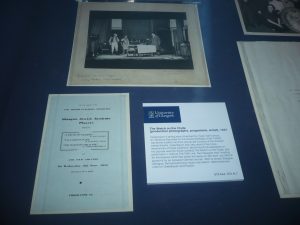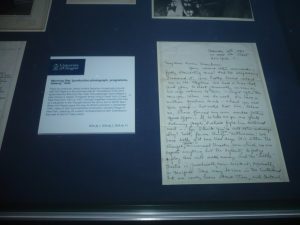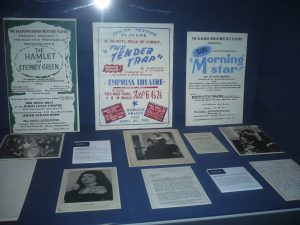The Glasgow The Glasgow Jewish Institute Players – opening the archive was a research project undertaken by Adrienne Scullion and Paul Maloney (Queen’s University Belfast) that explored the archival legacy of the Glasgow Jewish Institute Players (GJIP), a ground-breaking community theatre group active from 1936-1962. Founded by the director and playwright Avrom Greenbaum (1903-1963), the GJIP set new standards for non-professional theatre in Scotland, performing a wide repertoire of plays, including the Scottish, UK and European premieres of works by American writers, and helping redefine the role and identity of immigrant groups in the remaking of modern Scottish society. The project completed a full survey of all relevant material in the Scottish Theatre Archive (STA), including programmes, photographs, cuttings and playscripts and a full review of all available materials relating to the company in the Scottish Jewish Archive Centre (SJAC). The project also recorded and transcribed five new oral history interviews with veteran GJIP performers and a contemporary member of the Glasgow Jewish community with a significant link to the project’s locus. The project’s findings have been disseminated via papers at conferences in Glasgow and Vancouver, will be published in two academic journals, and in new materials on the STA webpages. In addition the researchers contributed a blogpost based on this research to the STA website: Avrom Greenbaum and the Glasgow Jewish Institute Players For a copy of the report please contact info@royalphil.org Elliot Porter – Undermining the Chauvinist Intuition: Comparing the commitments dominant theories of autonomy have concerning cases of mental disorder. It is commonly considered intuitive that if a person has a (serious) mental disorder their autonomy will be, in some way, impaired. That is to say, they are less able to make decisions to govern their life or the decision they make have less authority to govern their life. This work investigated the commitments various popular theories of autonomy had concerning archetypal cases of mental disorder and examined what, if any, consensus emerged. It was found that only weak or partial consensus was found between theories when asked if these sorts of disorder did injure a person’s autonomy, and very little consensus was found when asked what features of these mental disorders were injuring autonomy. This work argued that the intuition is unsafe, and that we should pay careful attention to which features of mental disorder we think are morally relevant when discussing the autonomy of people with mental disorders, as there is much disagreement as to which cases of mental disorder injure autonomy, and why. Inattention on this front risks not taking seriously the autonomous wishes of some people because we, mistakenly, think their autonomy has been impaired when it has not. A copy of the dissertation can be requested from info@royalphil.org Some of the reports we have received on individual projects: “For an early career researcher, this is an innovate project using up-to-date, blog, video and social media methods to produce a lasting legacy.” “The project is modest in scope but has potential to have a disproportionately large impact in encouraging young people including young women, into careers in science and technology. The project is a pilot which, if successful, is likely to lead to UK government funding to expand it further.” 2016 Award



